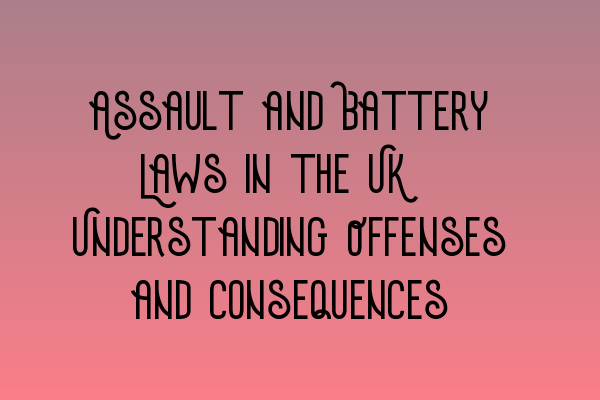Assault and Battery Laws in the UK: Understanding Offenses and Consequences
When it comes to criminal offenses, assault and battery are two terms that are often used interchangeably. However, in the legal context, they have distinct meanings and can result in severe consequences for those involved. In this article, we will delve into the assault and battery laws in the UK, providing a clear understanding of the offenses and their potential implications.
What is Assault?
Assault is the act of intentionally causing another person to apprehend immediate and unlawful violence. It is important to note that physical contact does not necessarily have to occur for an action to be considered an assault. A mere threat or offensive gesture can be enough to constitute an assault under UK law.
Assault offenses are classified into two categories: common assault and aggravated assault. Common assault refers to less serious offenses involving no or minimal physical harm, such as minor physical contact or threatening behavior. On the other hand, aggravated assault involves more serious acts that inflict significant harm, cause injury, or involve the use of weapons.
It is crucial to understand that assault is a criminal offense, regardless of whether the victim suffers any physical harm. The intention to cause fear or apprehension alone can lead to criminal charges and legal consequences.
What is Battery?
Battery, unlike assault, involves the intentional and unlawful physical contact with another person. It encompasses actions that directly and intentionally cause physical harm to another individual. For an act to be considered battery, it must involve an offensive physical contact without the consent of the victim.
Similar to assault, battery offenses have varying degrees of severity. Simple battery refers to cases where physical harm is inflicted upon another person without causing significant injury. On the other hand, aggravated battery involves more serious acts resulting in severe injury or the use of weapons.
It is important to note that battery charges can be brought even if the victim did not suffer any visible injuries. The mere act of unwanted physical contact is sufficient to constitute battery under UK law.
Consequences of Assault and Battery
The consequences of assault and battery convictions in the UK can vary depending on the severity of the offense. Generally, these offenses are treated as criminal acts and can result in imprisonment, fines, community service, restraining orders, or a combination of these penalties.
In cases of common assault or simple battery, where there is minimal harm inflicted, the punishment may not be as severe. However, aggravated assault or battery offenses, involving significant injury, the use of weapons, or other aggravating factors, can lead to more severe penalties, including longer prison terms.
It is also important to consider the long-term consequences of an assault or battery conviction. A criminal record can have a lasting impact on one’s personal and professional life. It can affect employment opportunities, travel prospects, and even custodial rights in certain cases.
Seeking Legal Assistance
If you have been charged with assault or battery, it is crucial to seek legal assistance from a qualified criminal defense solicitor. They can provide guidance throughout the legal process, explain your rights, and help build a strong defense strategy tailored to your specific case.
At SQE Criminal Law & Practice Law UK, we specialize in criminal defense and can provide experienced solicitors to handle your case. Our team is well-versed in assault and battery laws in the UK and can offer expert advice and representation to protect your rights and interests.
To learn more about the Solicitors Qualifying Examination (SQE) and essential study materials for aspiring solicitors, check out our article: SQE Exam Prep: Essential Study Materials for Aspiring Solicitors.
To understand the format of the Solicitors Qualifying Examination (SQE) and its requirements, read our article: Demystifying the Solicitors Qualifying Examination Format.
If you are an international lawyer preparing to take the SQE, our article on the challenges and success strategies for the SQE Exam for international lawyers is a must-read: SQE Exam for International Lawyers: Challenges and Success Strategies.
For UK entrepreneurs looking to form a limited liability company (LLC), our step-by-step guides provide valuable insights. Check out our articles: LLC Formation Made Simple: Step-by-Step Guide for UK Entrepreneurs and LLC Formation: A Step-by-Step Guide for UK Entrepreneurs.
Remember, understanding assault and battery laws in the UK is essential to protect yourself and others. If you find yourself involved in such a situation, seek legal help immediately to ensure your rights are upheld and that you receive fair treatment under the law.
